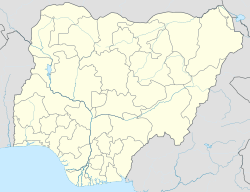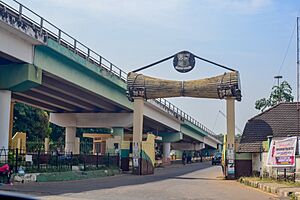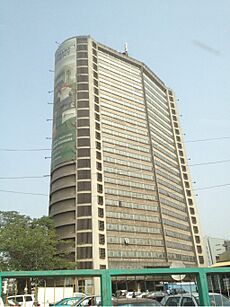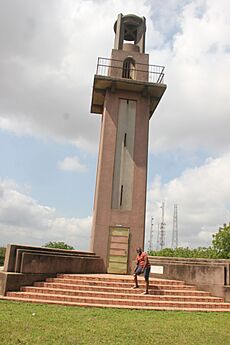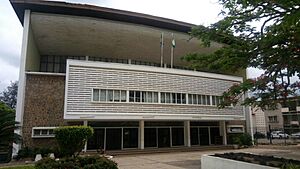Ibadan facts for kids
Quick facts for kids
Ibadan
|
|
|---|---|
|
Metropolis
|
|
| Ibadan | |
| Nickname(s):
Ilé Oluyole Ìlú Ogunmola
|
|
| Country | |
| State | Oyo |
| War camp | 1829 |
| Ibadan District Council | 1961 |
| Ibadan Municipal Government | 1989 |
| Area | |
| • Metropolis | 1,680 km2 (650 sq mi) |
| • Urban | 2,102 km2 (812 sq mi) |
| Area rank | 1st |
| Elevation | 230 m (750 ft) |
| Population
(2006)
|
|
| • Metropolis | 2,559,853 |
| • Estimate
(2021)
|
3,649,000 |
| • Rank | 3rd |
| • Density | 985.13/km2 (2,551.5/sq mi) |
| • Urban | 3,552,000 |
| • Urban density | 464.71/km2 (1,203.6/sq mi) |
| • Metro | 4,000,000 (estimated) |
| GDP (PPP, constant 2015 values) | |
| • Year | 2023 |
| • Total | $29.0 billion |
| • Per capita | $7,500 |
| Time zone | UTC+01:00 (WAT) |
| National language | Yoruba |
| Website | http://www.oyostate.gov.ng/ |
Ibadan is the capital and largest city of Oyo State in Nigeria. It is the third-largest city in Nigeria by population, after Lagos and Kano. In 2021, it had about 2.6 million people, with over 3 million in its wider metropolitan area. Ibadan is also one of Nigeria's largest cities by land area.
When Nigeria became independent in 1960, Ibadan was the biggest and most populated city in the country. It was also the second most populated city in Africa, right after Cairo. Today, Ibadan is one of the fastest-growing cities in sub-Saharan Africa. It is also ranked third in West Africa for its growing number of tech startups. In 2016, Ibadan joined the UNESCO Global Network of Learning Cities.
Ibadan is located in south-western Nigeria. It is about 128 kilometers (80 miles) northeast of Lagos and 530 kilometers (330 miles) southwest of Abuja, Nigeria's capital. It's a key travel spot between the coast and the country's inner regions. Ibadan was the main administrative center for the old Western Region during British colonial rule. Parts of the city's old protective walls can still be seen today. Most people living in Ibadan are Yoruba people, but there are also many other groups like Igbo, Hausa, Edo, and Ibibio from other parts of Nigeria.
Contents
History of Ibadan
Ibadan's name comes from "Eba-Odan," which means 'by the edge of the meadow.' The city started in 1829 during a time of great change in Yorubaland. Many old Yoruba cities disappeared, and new ones like Abeokuta and Ibadan grew.
Local stories say that Lagelu founded Ibadan. It was first meant to be a war camp for warriors from Oyo, Ife, and Ijebu. The camp's location on hills, between 160 and 275 meters high, made it a great place for defense. Also, being at the edge of the forest helped it become a trading center for goods from both forest and grassland areas.
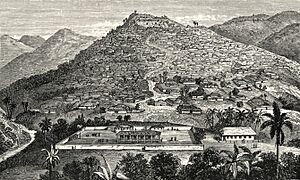
In 1852, the Church Missionary Society sent David and Anna Hinderer to start a mission. They arrived in 1853 and decided to build their mission and a church in Ibadan.
Ibadan began as a military state and stayed that way until the late 1800s. From the 1860s to the 1890s, it built a large empire across much of northern and eastern Yorubaland. It was even called idi-Ibon, meaning "gun base," because of its strong military.
Unlike other Yoruba cities with traditional kings, in Ibadan, the warriors became the city's rulers and most important business people.
Ibadan grew into a large city very quickly. By the end of 1829, it was strong militarily, politically, and economically in the Yoruba region. The city grew even more when many refugees came from northern Oyo after attacks by Fulani warriors. These Fulani warriors tried to expand further south into Nigeria but were stopped by Ibadan's armies in 1840.
During the colonial period, Ibadan became even more important. After a short period of rubber trade (1901–1913), cocoa became the main product. This brought European and other traders to the city. Ibadan became a major trading hub because of its central location and easy access from Lagos. It was chosen as the headquarters of the Western Provinces in 1939.
Ibadan Becomes a British Protectorate
In 1893, the Ibadan area became a British Protectorate. This happened after Fijabi, the Baale of Ibadan, signed a treaty with the British acting Governor of Lagos Colony, George C. Denton, on August 15. By then, Ibadan's population had grown to 120,000 people. The British helped the colony grow to support their business, and Ibadan quickly became the major trading center it is today.
Geography and Climate
Ibadan is in south-western Nigeria, in the southeastern part of Oyo State. It's about 119 kilometers (74 miles) northeast of Lagos. The city is located in the tropical forest zone, near where the forest meets the savanna. Its elevation ranges from 150 meters (490 feet) in the valleys to 275 meters (900 feet) on the main hills. Ibadan covers a total area of 3080 square kilometers (1189 square miles), making it the largest city in Nigeria by area.
Five main rivers and their smaller branches drain the city of Ibadan. These include the Ona River, Ogbere River, Ogunpa River, and Kudeti River. Lake Eleyele is in the northwestern part of the city. The Asejire Lake is to the east.
Ibadan's Weather
Ibadan has a tropical wet and dry climate. This means it has a long wet season and temperatures that stay fairly constant all year. The wet season runs from March to October, though there's a slight break in August. The dry season is from November to February, when Ibadan experiences the typical West African harmattan winds.
On average, Ibadan gets about 1230 millimeters (48 inches) of rain over about 123 days each year. The rainiest months are June and September. The average daily temperature is about 26.46°C (79.63°F).
Places to Worship
Ibadan has many places of worship for different faiths.
- For Christians, there are churches like the Church of Nigeria (Anglican Communion), Presbyterian Church of Nigeria, Nigerian Baptist Convention, Living Faith Church Worldwide, Redeemed Christian Church of God, and the Roman Catholic Archdiocese of Ibadan.
- For Muslims, there are many mosques throughout the city.
Famous Buildings and Landmarks
To get around Ibadan, people often use famous buildings and landmarks as guides.
Dugbe district is the main business area of Ibadan. Many banks have branches here. The Central Bank of Nigeria has its regional office in Dugbe.
The Cocoa House is also in Dugbe. It was Nigeria's first skyscraper and is one of the few tall buildings in the city. It is the main office for the Oodua Investment Company, which is owned by all the south-western states. Other tall buildings in the Dugbe area include the Femi Johnson glass house and the United Bank for Africa building.
There is a museum inside the Institute of African Studies building. It shows amazing ancient bronze carvings and statues. Ibadan also has several well-stocked libraries and was home to the first television station in Africa. The city has two zoological gardens: one at the University of Ibadan and another at Agodi Gardens, which also has a botanical garden.
The Bower's Tower, built in 1936, is on Oke Aàre (Aare's Hill). "Aare" means commander-in-chief in Yoruba. You can see the tower from almost anywhere in the city, and from the top, you get a great view of Ibadan. It's named after Robert Lister Bower and is sometimes called "Láyípo" because of its spiral staircase.
Other important buildings include Mapo Hall, which is the colonial-style city hall on top of "Oke Mapo" (Mapo Hill). There's also the cultural center Mokola and the Obafemi Awolowo Stadium (formerly Liberty Stadium). The University of Ibadan (formerly the University College of Ibadan) was the first higher learning institution in Nigeria. The Obafemi Awolowo Hall at the University of Ibadan is said to be one of the tallest and largest hostels in West Africa. The University College Hospital, Ibadan (UCH), Nigeria's first teaching hospital, was also built in this historic city.
Education and Learning
Ibadan is home to Nigeria's top university, the University of Ibadan. It started as a college of the University of London in 1948 and became an independent university in 1962. Other higher education schools in the city include:
- The Polytechnic, Ibadan
- Lead City University
- First Technical University
- Kola Daisi University
There are also many public and private primary and secondary schools in and around the city.
Other important places for learning and research in Ibadan include:
- The University College Hospital, Ibadan (UCH), which is Nigeria's first teaching hospital.
- The International Institute of Tropical Agriculture (IITA), which has its main office in Ibadan. It was started in 1967 and focuses on farming needs in tropical countries.
- The Nigerian Institute of Social and Economic Research (NISER).
- The Cocoa Research Institute of Nigeria.
- The National Root Crops Research Institute.
- The Institute of Agricultural Research and Training (IAR&T).
- The Forestry Research Institute of Nigeria.
- The Nigerian Horticultural Research Institute (NIHORT).
In 1853, the first Europeans to live in Ibadan, Reverend David and Anna Hinderer, started Ibadan's first Western schools. They built churches, and Anna taught at the new school. They also built the first two-story building in Ibadan, which you can still find today at Kudeti. The first students to attend an elementary school in Ibadan were Yejide Olunloyo (a girl) and Akinyele Olunloyo (a boy), who were children of an Ibadan high chief.
Economy and Jobs
Ibadan is the capital city of Oyo State, which has the fourth-largest state economy in Nigeria. It's also the second-largest non-oil state economy in Nigeria, after Lagos state. Because of its location on the railway line connecting Lagos to Kano, Ibadan is a major center for trading products like cassava, cocoa, cotton, timber, rubber, and palm oil.
The city and its surrounding areas have many different industries. These include:
- Agro-allied businesses (related to farming)
- Textile (cloth) production
- Food processing
- Health care and cosmetics
- Tobacco processing and cigarette making
- Leatherworks and furniture making
There is a lot of clay, kaolin, and aquamarine in the areas around the city. Ibadan also has several cattle ranches, a dairy farm, and a commercial abattoir (a place where animals are processed for meat). Many banks and insurance companies serve the city's millions of residents.
The main jobs in Ibadan include farming, trading, public service, factory work, and service jobs. The International Institute of Tropical Agriculture (IITA) has large areas for researching important tropical crops like bananas, maize, cassava, and yam. A report says that Ibadan is the third cheapest Nigerian city to live in.
Fun and Recreation
Ibadan is a busy city, but it also has many places for fun and relaxation.
Sports and Activities
Ibadan has various sports centers and facilities. The Ibadan Recreational Club, started in 1902, is one of the oldest clubs in Nigeria. It has a swimming pool, tennis courts, basketball courts, and more. The city also has many football academies where young soccer players train.
Agodi Gardens in Oyo State has been fully updated. It now includes a Botanical Garden, Zoo, Swimming pool, Guest house, Bar, and Restaurants. There's also the Ibadan Polo Club at Eleyele and the Ibadan Golf Club in Onireke.
The city has Nigeria's first standard stadium, The Obafemi Awolowo Stadium (formerly Liberty Stadium). It also has The Lekan Salami Stadium, which is home to the Shooting Stars football club. This team won Nigeria's first international trophy, The African Cup Winners' Cup, in 1976.
Public Spaces and Parks
- Trans Amusement Park
- Agodi Gardens and Leisure Park
- Ibadan Recreational Park
- The University of Ibadan Zoo
Transportation
Ibadan is a major transport hub in Nigeria. Freeways connect it to Lagos in the southwest, Abeokuta in the west, and cities like Oyo and Ilorin in the north. The city also has the Ibadan Airport, with daily flights to cities like Abuja and Lagos.
Ibadan is a main stop on the main railway line that links Lagos with Kano in the north. Most major roads in Ibadan are dualized (have two lanes in each direction). Examples include the Ojoo-Sango-Mokola road and the Ring Road-Orita-Challenge-New Garage roads. The Mokola flyover was recently built to help reduce traffic jams in the Mokola area.
Ways to get around the city include:
- Cabs and taxis
- Taxi-vans (called Danfos)
- Mass transit buses
- Private cars
- Scooters (called Okadas)
- Long-distance bus services (like Alakowe Bus and ABC Transport) that connect Ibadan to other major cities.
Since 2021, a new railway connection allows passengers to travel to Lagos in less than 3 hours. This new railway line also came with a new railway station.
Phase 1 of the Ibadan circular road, a 110-kilometer (68-mile) road that goes around Ibadan, is currently being built.
Media and News
Ibadan is home to Africa's first TV station, NTA Ibadan, which started as Western Nigeria Television (WNTV) in 1959. The oldest newspaper still running in Nigeria, the Tribune, was founded in Ibadan by Chief Obafemi Awolowo. The first private TV station in Oyo State, Galaxy TV, also started in Ibadan.
As of 2014, the city has many media outlets, including:
- Nigerian Television Authority Ibadan Network Centre
- Galaxy TV
- B.C.O.S Broadcasting Corporation of Oyo State (which also runs B.C.O.S radio 1 and Oluyole FM 98.5)
- MITV Ibadan
- Silverbird TV
- Channels TV
- AIT Africa Independent Television
Satellite TV channels are provided by:
- Multichoice Africa (DStv and GOTV)
- Star Times
- DaarSat
The number of radio stations in Ibadan has grown a lot. Today, there are many, including:
- B.C.O.S Radio 1 and Oluyole FM 98.5
- Premier FM 93.5
- Amuludun FM 99.1 (Yoruba only)
- Beat FM 97.9
- Splash FM 105.5
- Fresh FM 105.9
There are also online communities for Ibadan residents, such as CONNECTIBADAN and WhatsupIbadan. These help people connect with news, events, and other people in Ibadan and Oyo State.
Famous People from Ibadan
- Sade Adu, a famous singer
- Hugo Weaving, an actor
- Rasheed Ladoja, a former Governor of Oyo State
- Wally Adeyemo, a U.S. government official
Sister Cities
Ibadan is connected with:
 Cleveland, United States
Cleveland, United States
Images for kids
See also
 In Spanish: Ibadán para niños
In Spanish: Ibadán para niños
 | Jessica Watkins |
 | Robert Henry Lawrence Jr. |
 | Mae Jemison |
 | Sian Proctor |
 | Guion Bluford |


